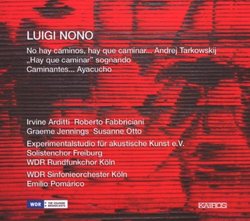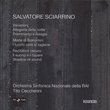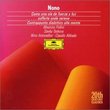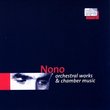| All Artists: Luigi Nono, Emilio Pomarico, WDR Sinfonieorchester Köln, Roberto Fabbriciani, Graeme Jennings, Susanne Otto, Solistenchor Freiburg, WDR Rundfunkchor Köln Title: Nono: No hay caminos, hay que caminar... Andrej Tarkowsky / Hay que caminar sognando / Caminantes... Ayacucho Members Wishing: 1 Total Copies: 0 Label: Kairos Release Date: 11/1/2008 Genres: Pop, Classical Styles: Vocal Pop, Chamber Music, Historical Periods, Modern, 20th, & 21st Century Number of Discs: 2 SwapaCD Credits: 2 |
Search - Luigi Nono, Emilio Pomarico, WDR Sinfonieorchester Köln :: Nono: No hay caminos, hay que caminar... Andrej Tarkowsky / Hay que caminar sognando / Caminantes... Ayacucho
 | Luigi Nono, Emilio Pomarico, WDR Sinfonieorchester Köln Nono: No hay caminos, hay que caminar... Andrej Tarkowsky / Hay que caminar sognando / Caminantes... Ayacucho Genres: Pop, Classical |
Larger Image |
CD DetailsSimilar CDs |
CD ReviewsThe Largest Work of Nono's Last Years James S. Eisenberg | 02/03/2009 (5 out of 5 stars) "Opinions vary greatly about the achievements of Luigi Nono's last years. The composer ultimately arrived at a style informed by live electronics, often quiet to the point of inaudibility, but peppered with sudden outbursts of extreme violence. Stereophonic effects and quarter tones also feature prominently. This style is very far from traditional classical concert music. The composer wants you to make an effort to really listen.
These last works require a lot of patience but can be very rewarding. The CAMINANTES Cycle is the composer's last and most important achievement after the giant PROMETEO cantata. The first two works in the cycle, NO HAY CAMINOS for seven orchestral groups and HAY QUE CAMINAR for two violins have both been recorded several times before. The current performances are first rate, but don't really break any new interpretive ground. (I am at a loss to explain why the Abbado recording of NO HAY CAMINOS on Deutsche Grammophon is seven minutes shorter than the current performance. Statements by the late composer and others about the importance of hall acoustics in timing these late works don't manage to cover that much of a discrepancy.) The real interest here must center on the first commercially issued recording of CAMINANTES....AYACUCHO (1986-87) for Alto solo, Bass Flute, Organ, semi chorus, full chorus and three orchestral groups. It is a setting of a 1584 text by Giordano Bruno in Latin. It makes a powerful and disturbing impression. As in most of Nono's works involving live electronics, the solo parts are so absorbed into the whole musical fabric that the performances can't really be critiqued in a traditional way. Although these musicians must be extremely secure technically, the old fashioned virtuosity that informed solo interpretation in this composer's early works is nowhere to be found here. It is the choral and orchestral sound that engages and dazzles. More than any other work of the late period, this one "works" in a traditional sense. The techniques may be radical, but there is an old fashioned effectiveness at work here. While I don't ever see this being programmed with the Brahms ALTO RHAPSODY, there is something boldly dramatic about the huge contrasts in volume and the brilliant orchestral and choral colors. It fascinates and never bores. The sound recording is remarkably clear. At thirty-four minutes and thirty-three seconds, the second disc is not generous. As many important works from all periods of Nono's output remain unrecorded and this is a pretty expensive set, it is a pity that some filler couldn't have been added." |



![Nono: Prometeo, Tragedia dell'ascolto [Hybrid SACD]](https://nationalbookswap.com/cd//m/37/1537/6161537.jpg)
